Global Environment
The thrice-yearly journal Global Environment: A Journal of History and Natural and Social Sciences acts as a forum and echo chamber for ongoing studies on the environment and world history, with special focus on modern and contemporary topics. It aims to gather and stimulate scholarship that, despite a diversity of approaches and themes, shares an environmental perspective on world history in its various facets, including economic development, social relations, production government, and international relations.
Global Environment is published by the White Horse Press. It includes peer-reviewed research articles as well as interviews and other special features. The Rachel Carson Center produces one special issue per year; topics usually result from research projects at the center.

Coudreau, Marin, and Céline Pessis, eds. “Silent Springs. Global Histories of Pesticides and our Toxic World(s).” Special Issue, Global Environment 17, no. 2 (2024). liverpooluniversitypress.co.uk/toc/whpge/17/2.
This Rachel Carson Center special issue is open access. Follow this link to read the full PDF.
“How many ‘silent springs’ have there been since Rachel Carson published Silent Spring in 1962?” With this question, the special issue begins its global journey through the recent history of pesticides and the environment. It tracks toxicity in the production of vegetables and spices, in the products, and in the final waste; it questions pesticide regulations and their resistance movements; and it enquires through its creative contributions how we come into contact and interact with peticides in our everyday life.

Dürr, Eveline, Regine Keller, and Daniel Dumas, eds. “Irritations and Unforseen Consequences of the Urban: Debating Natures, Politics, and Timescapes.” Special Issue, Global Environment 16, no. 2 (2023). www.whpress.co.uk/publications/2023/05/24/ge-vol-16-2-2023/.
Starting with the example of the renaturalisation of the Isar, the mountain river that flows through Munich, the contributers illustrate and discuss clashes between urban and nature. “With this dossier, we contend that city dwellers are constantly confronted with irritations and unpredictable consequences of the urban, and many actions and projects take a seemingly unplanned course as a result. Rather than the exception, or proof of insufficiently thorough planning, this can be seen as a common process. Thus, the unintended, accidental and unplanned results of an intervention turn out to be equally as important as the meticulously planned project itself.”
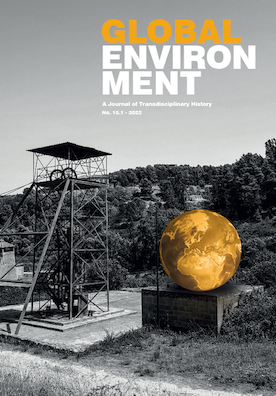 Jawad Daheur, ed. “Extractive Peripheries in Europe: Quest for Resources and Changing Environments (Fifteenth-Twentieth Centuries).” Special Issue, Global Environment 15, no. 1 (2022).
Jawad Daheur, ed. “Extractive Peripheries in Europe: Quest for Resources and Changing Environments (Fifteenth-Twentieth Centuries).” Special Issue, Global Environment 15, no. 1 (2022).
For many decades, the question of the roots of Western hegemony has been a controversial issue. To some extent, Fernand Braudel claimed, Europe’s global dominance began at sea. Given the exhaustion of natural resources and the extra space needed for agriculture, at the turn of the fifteenth and sixteenth centuries Europeans were forced to go overseas in order to ease deficiencies in resources available at home and to further develop their economies. […] The papers gathered in this issue aim to transcend the bias that has informed large parts of the historiography so far, where the issue of global natural resource extraction is mainly analyzed in terms of colonial and neo-colonial plunder of distant territories and therefore through the lens of the West’s relations with other parts of the world.
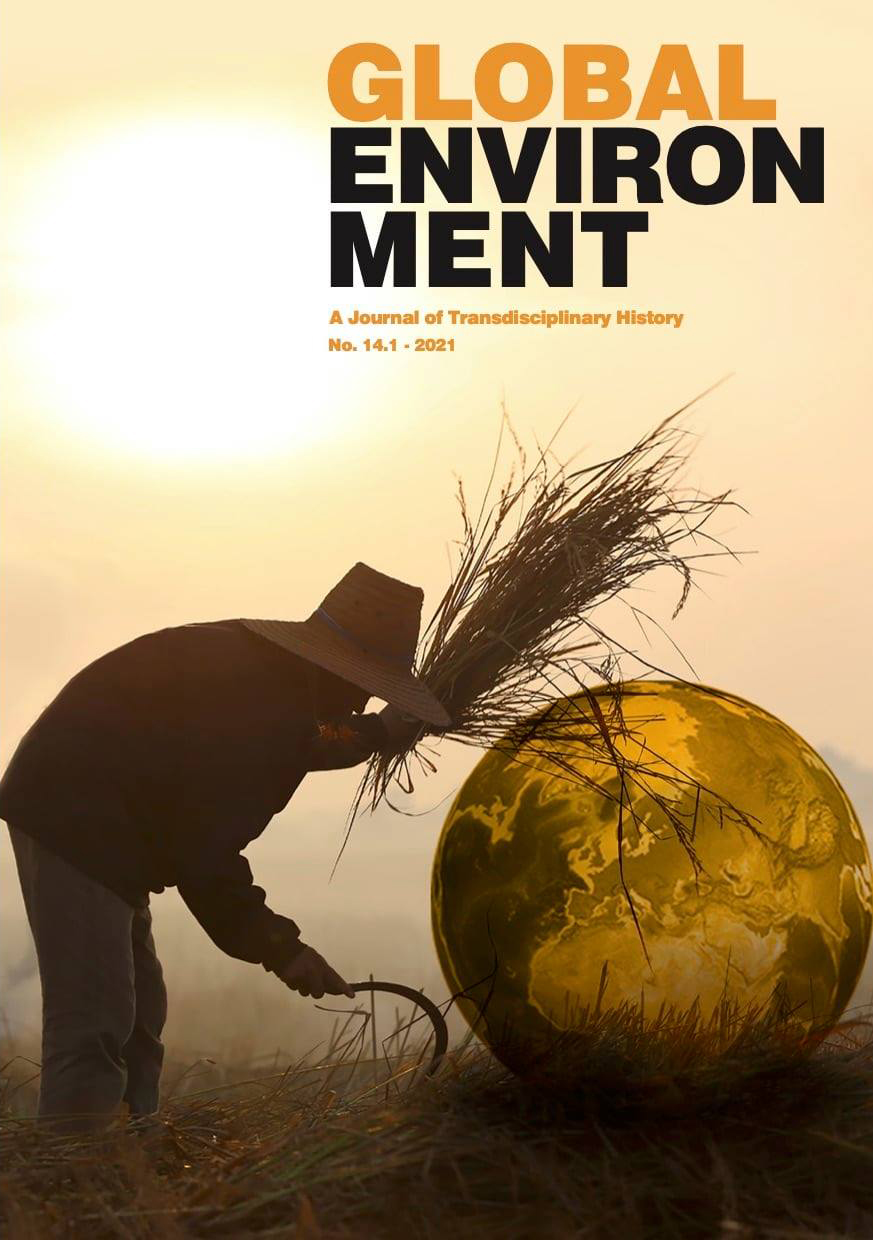
Javier Puente, ed. "The Environmental and Ecological Impacts of Guerrilla and Irregular Warfare." Special Issue, Global Environment 14, no. 1 (2021).
“Irregular” or “unconventional” warfare is often characterized by the contested position of the state within the conflict and the infrequency and intermittence of violence itself. A robust body of work about the environmental impact of international warfare has called for the need to address the specificities of irregular and unconventional conflicts in creating environmental and ecological transformations, and this volume starts the conversation about such conflicts and their subsequent ecological “disruptions.” Focusing on examples from the Global South, the authors examine the complexities of guerrilla warfare, internal strife, and other domestic experiences of state and sociopolitical violence.
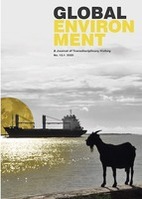 Ulrich Kirchberger, ed. "Horizons of Ecological Change: Stories of Transfer across the Indian Ocean in the Age of Empire." Special Issue, Global Environment 13, no. 1 (2020).
Ulrich Kirchberger, ed. "Horizons of Ecological Change: Stories of Transfer across the Indian Ocean in the Age of Empire." Special Issue, Global Environment 13, no. 1 (2020).
The Indian Ocean has always been a space of ecological exchange. People, plants, and animals crossed it and transformed the natural environments of Africa, Asia, and Australia over long periods of time. In the nineteenth century, when European colonial powers expanded their influence, these exchanges increased. Humans and non-humans moved across the ocean to an unprecedented degree. This special issue comprises a selection of revised papers that were originally presented at a workshop at the RCC in September 2018. The articles assembled in this issue aim to shed new light on the history of ecological transfer across the Indian Ocean in the age of empire.
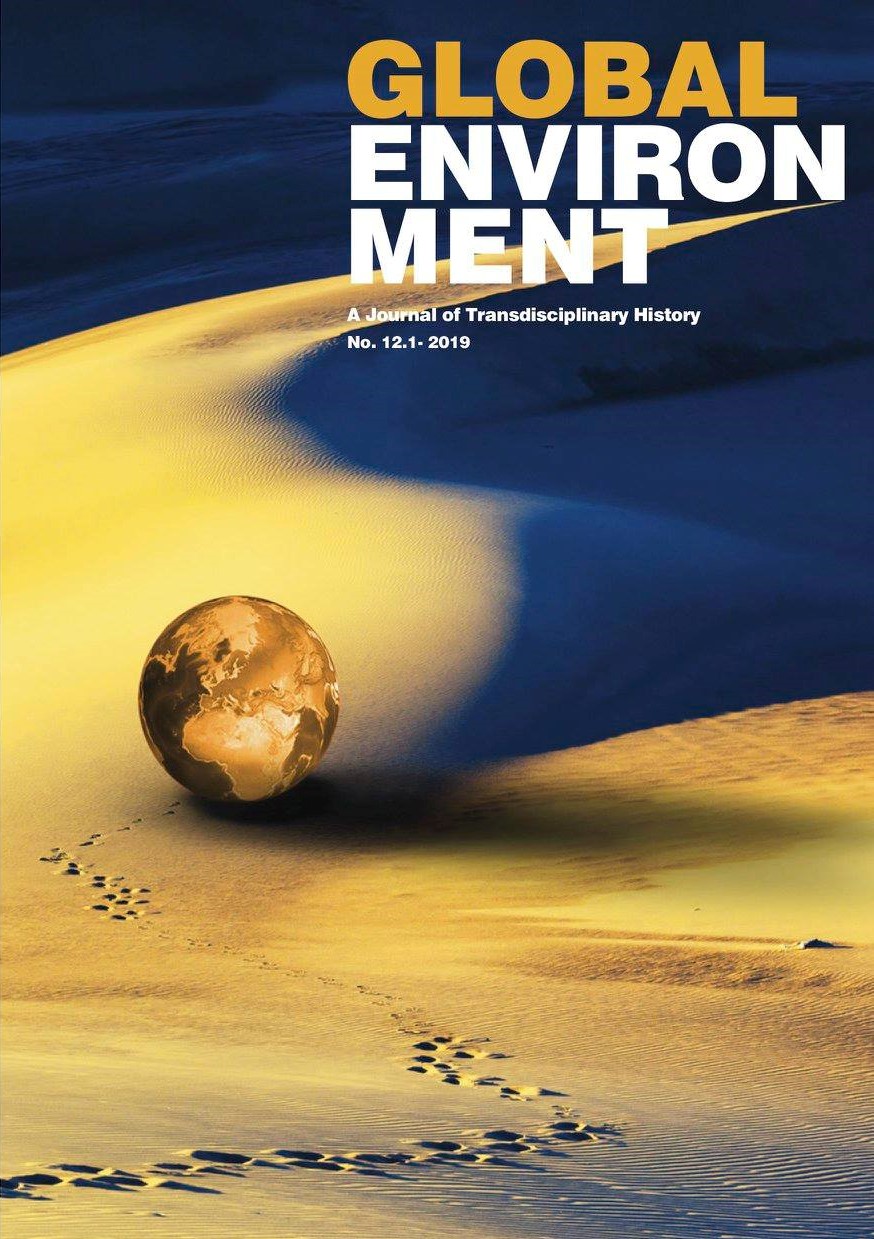
Andrew C. Isenberg, Katherine G. Morrissey, and Louis S. Warren, eds. "Deserts in Environmental History." Special Issue, Global Environment 12, no. 1 (2019).
Deserts have long perplexed outsiders. Across different times and spaces, travelers and would-be conquerors have seen deserts not only as forbidding environments in their own right—scorched and seemingly lifeless—but as places that exemplify and reflect social chaos. This special issue of Global Environment takes empire, a common theme suggested by much of the foregoing work on deserts, and investigates it in a global context. In all the essays in this volume, agents of empire encountered desert environments and struggled to understand and control them. The essays, taken collectively, place both projects of desert "improvement" and the threats posed by desertification in a trans-imperial context.
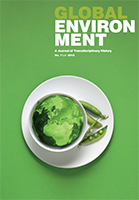
Michelle Mart and Daniel J. Philippon, eds. "Changing Food Cultures, Changing Global Environments." Special Issue, Global Environment 11, no. 1 (2018).
Food and power have long been closely tied; in politics and culture, and at local and global scales. As many people feel powerless to withstand ongoing assaults to democracy and global environments, they are turning something they can control—food—and driving a growing global movement. This special issue of Global Environment explores the environmental history of how individuals and cultures have “consumed the world” through eating and drinking. From an interdisciplinary and multicultural perspective, the pieces speak to the dynamic processes behind global environmental change over time. Alongside contributions by the editors those of Matthew Booker, Graham H. Cornwell, Ernst Langthaler, Sookyeong Hong, Laura Sayre, Stefano Magagnoli, and Raj Patel.
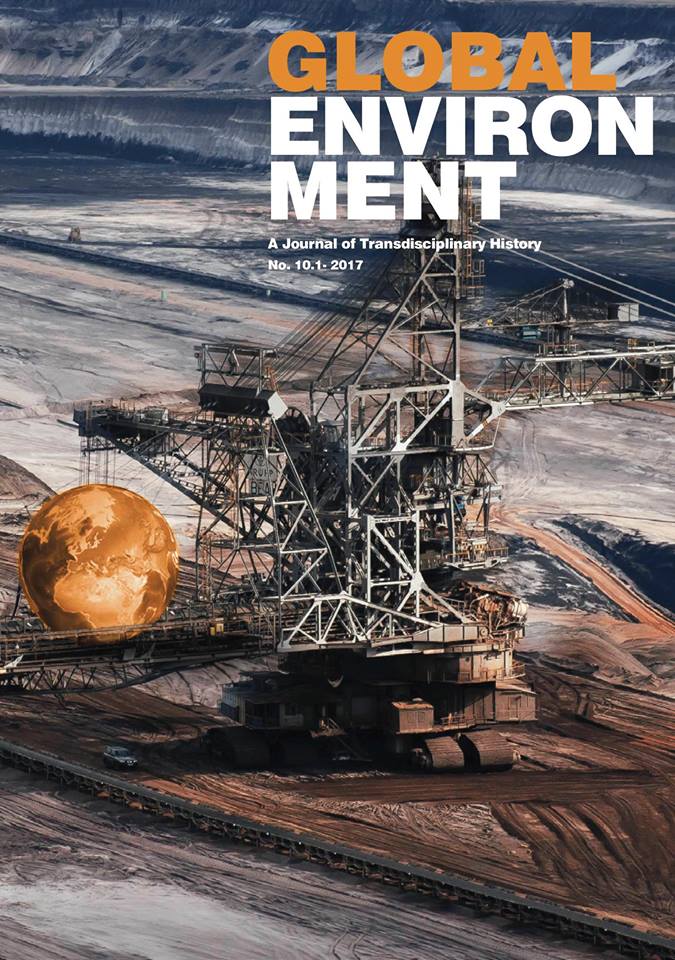
Today's landscapes are culturally constructed environments, often industrialised ones, that have been shaped by human interventions over thousands of years. Taking its inspiration from the work of photographer and filmmaker Edward Burtynsky, this volume collects studies of such "manufactured landscapes" around the world. The authors draw on insights from genetics, ecology, the history of science, economics and politics to shed light on the way these landscapes arise, and more importantly, the factors that influence their change over time, as well as the sometimes unexpected consequences of human interventions. Topics range from traditional sericulture to the landscapes of monocropped, mechanized agriculture, from infrastructure such as dams and roads to landscapes marked by the enduring presence of pollutants and toxins.
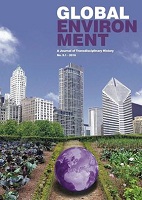
Agnes Kneitz, ed. "The Country and the City." Special Issue, Global Environment 9, no. 1 (2016).
Forty years ago, Raymond Williams examined literary portrayals of the country and the city, arguing that the dichotomy of the pastoral countryside and the bustling, modern city in fact obscured the interdependency of these two realms and the common exploitation of both rural and urban workers. This volume revisits Williams' work in the light of environmental history and aims to create a more complex understanding of the interconnections between city and countryside. Global in scope, the contributions represent a wide variety of disciplinary approaches—from environmental history and geography to architecture and political science—and explore topics such as the feces-fertilizer cycle in China, anti-urban policies in Tanzania, landfills and air pollution in the United States and England, and fisheries in Japan.
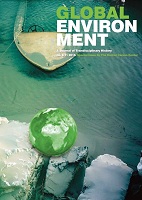
Rebecca Hofmann and Uwe Lübken, ed. "Small Islands and Natural Hazards." Special Issue, Global Environment 8, no. 1 (2015).
Seen as insignificant due to their size, small islands have often been ignored by mainstream historical research. However, in a world facing climate change and rising sea levels, these places have turned into pioneer communities at the forefront of global environmental change. This special issue offers interdisciplinary perspective on natural hazards and the problem they cause for small islands. It offers a corrective to the focus on vulnerability, which neglects the fact that small island communities have thrived for centuries, often dealing with these challenges successfully. The case studies in this issue consider whether or not disasters define island life and whether there is something unique and instructive in how small islands deal with hazards.
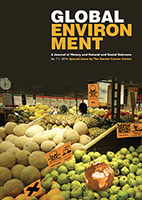
Paul Erker, ed. "Hazardous Substances: Perceptions, Regulations, Consequences." Special issue, Global Environment 7, no. 1 (2014).
During the past two centuries, millions of new substances have been discovered, and thousands of them have become novel industrial products. For a number of these substances, large-scale production, by-products, and waste have led to previously unknown effects on human health and the environment. The main focus of this special issue of Global Environment is the interaction between the growing presence of hazardous substances in the economy and the environment, and the cultural, scientific, regulatory, and legal responses by modern society to these hazards. It brings together insights from various disciplines in the historical and social sciences, emphasizing the global history and international dimensions of each substance.
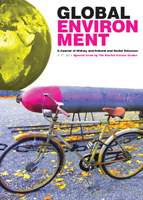
Frank Uekötter, ed. "Environment and Memory." Special issue, Global Environment 11 (2013).
Memory studies seek to lead environmental history into an exchange with the current environmental movement, and that brings scholars into the midst of a messy relationship. It seems that the link between environmentalism and environmental history has grown more complicated in recent years, and as it stands, environmentalism has both too little and too much memory. Environmentalism’s overwhelming concern with the present and the future has found a reflection in a vocabulary that is seemingly devoid of history: ecology, wilderness, Gaia, peace with nature, sustainability, biodiversity, climate change, no-risk. But is the environmental debate really taking place outside of history? The articles in this volume suggest, on the contrary, that the environmental discourse is full of history; it’s just that we don’t recognize it.
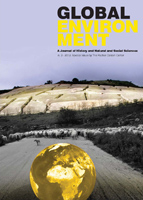
Uwe Lübken, ed. "Environmental Change and Migration in History." Special issue, Global Environment 9 (2012).
Evironmental migration is like a ghost; some insist they have seen it, while others deny its very existence. While “maximalists” argue that there is a direct causal connection between changes in the natural environment and the movement of people, “minimalists” point out that environmental factors in people’s decisions to migrate are difficult to detect and play a contributing role at best. Despite the great potential of a historical approach to environmental migration, historians themselves have also so far been remarkably silent on the topic. This special issue of Global Environment attempts to broaden the framework of the debate by adding historical depth to the analysis of environmental change and migration.

